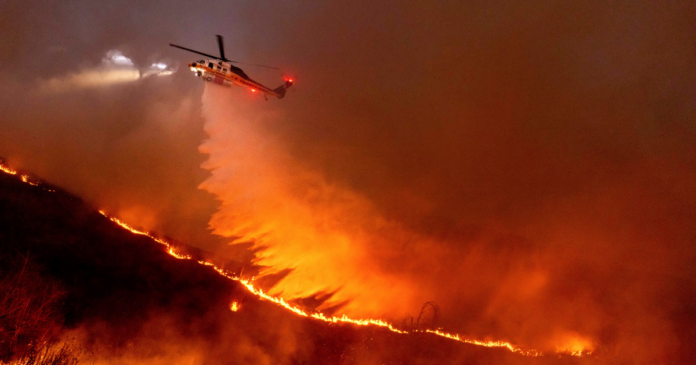The finale of the 2024 Summer Olympics in Paris featured a memorable televised “handover” to the next host city, Los Angeles. Billie Eilish and the Red Hot Chili Peppers performed in front of a quintessentially Californian backdrop: sandy beach, palm trees, blue ocean and crystal clear skies.
But that blissful image has been ruptured in recent days as parts of Los Angeles were engulfed in flames, reducing homes and businesses across the sprawling metropolis to smoldering heaps of ash and rubble, most calamitously in the Pacific Palisades and the community of Altadena.
It’s unlikely the 2028 Summer Olympics in Los Angeles will be moved — and so far none of the marquee arenas, stadiums or athlete housing complexes have been damaged by the flames. But the fires have nonetheless cast a shadow over the next installment of the Games.
Aerial view of the Los Angeles Memorial Coliseum in Los Angeles, on Nov. 29. Kirby Lee / Getty Images file
The task facing the city and the organizers who successfully brought the Games to the West Coast is no small feat: rebuild and rebound in time to host some 15 million people for the 17-day sports extravaganza.
At least one top official is confident the City of Angels will be back on its feet in time for the festivities. Casey Wasserman, the chairman of LA28, a private fundraising and organizing group behind the Games, touted the city’s tenacity in the face of obstacles.
“Los Angeles is defined by its resilience and determination,” Wasserman said in a statement. “The strength of our communities and our unity in tough times make this city extraordinary, and when Los Angeles welcomes the world in 2028, our spirit will shine brighter than ever before.”
Wasserman added that LA28’s “top priority” was “ensuring our community has the resources it needs and that our heroic first responders are fully supported in keeping people safe.”
When asked how the wildfires might affect preparations for the Games, a spokeswoman for Mayor Karen Bass did not directly reply but emphasized her administration’s commitment to handling the emergency.
Gabby Maarse said Bass was “laser focused on keeping Angelenos safe and protecting property. She is securing federal, state and local resources needed to continue fighting these fires and is moving forward on an all-of-the-above plan for recovery.”
California Gov. Gavin Newsom, in an interview with NBC’s “Meet the Press,” said he envisions a 21st century “Marshall Plan” to revive the parts of Los Angeles “ravaged by this disaster.”
“My humble position, and it’s not just being naively optimistic, that only reinforces the imperative [of] moving quickly, doing it in the spirit of collaboration and cooperation,” he said.
Newsom also said the crisis creates an opportunity for the incoming administration to lend a hand.
“President of the United States, Donald Trump, to his credit, was helpful in getting the Olympics to the United States of America, to get it down here in L.A. We thank him for that. This is an opportunity for him to shine, for this country to shine, for California and this community to shine,” Newsom said.
The 2028 Games will be spread throughout Southern California and stretch as far south as Temecula — about 90 miles southeast of downtown Los Angeles — and as far east as Oklahoma City, about 1,300 miles away, where softball and canoe slalom will be held.
Track and field and the opening ceremony are set for the historic L.A. Memorial Coliseum, while swimming figures to be a show-stopping event at SoFi Stadium, home of the Rams and the Chargers in nearby Inglewood.
In the coming years, LA28 organizers and municipal officials might find themselves competing for construction resources with private businesses and homeowners looking to rebuild. It’s likely that contractors and supplies will be pushed to the limit, and that’s before they factor in the temporary infrastructure required for the Games.
You’d have to go back more than a century to find another Olympics that was changed because of a natural disaster. Jeremy Fuchs, the author of a 2021 book about the history of the Olympics, pointed to one notable example from almost 120 years ago. Rome had been set to host the 1908 Summer Games. But after the deadly and violent eruption of Mount Vesuvius in 1906, Italian funds were diverted to support Rome’s recovery.
The 1908 Games were moved to London, though Rome got another chance in the summer of 1960.
One instance of the Games progressing in the wake of a recent catastrophe was when athletes descended on London in late July 1948, a little more than three years after the end of World War II.
The 1948 Olympics were known as the “Austerity Games” as rationing and other wartime restrictions were still in place.
“I very much doubt that L.A. 2028 will be comparable to the war-diminished 1920 and 1948 Games, the fire damage notwithstanding,” said John Hoberman, a University of Texas professor of cultural history who specializes in sports.
The Los Angeles wildfires have so far burned dangerously close to Rose Bowl in Pasadena and the Riviera Country Club in Pacific Palisades, local venues set for soccer and golf in 2028.
Hoberman said he couldn’t fathom the International Olympic Committee pulling the games from Los Angeles, short of more once-in-a-lifetime mass tragedies.
“It would take another catastrophe for the IOC to pull the games, which is a hugely political action in any case,” he said.
In a post on X on Sunday, IOC President Thomas Bach said the governing body was “in full solidarity with the citizens of Los Angeles and full of admiration for the tireless work of the firefighters and the security forces.”
“Currently the full focus must be on the fight against the fires and the protection of the people and property,” he added. “We have also learned that a great Olympian, Gary Hall Jr., has lost his medals in the fire. The IOC will provide him with replicas.”
NBC News’ parent company, NBCUniversal, owns NBC Sports and NBC Olympics. NBC Olympics is the U.S. broadcast rights holder to all Summer and Winter Games through 2032.


